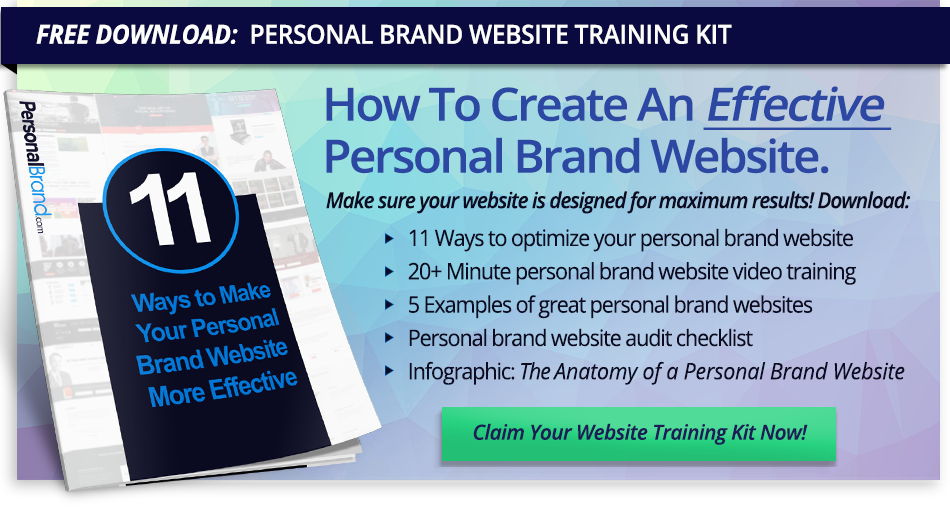Facebook COO, Sheryl Sandberg, Claims Personal Branding is “Not Right”- We Beg to Differ
Why everyone needs a personal brand (EXCEPT the billionaire COO of the world’s biggest social networking company)
When Facebook COO Sheryl Sandberg talked to psychologist and author Adam Grant, he asked her about the value of a personal brand.
She said that you don’t need one.
You can watch the interview here.
These are her words:
“You don’t have a brand. Crest has a brand. Perrier has a brand. When I hear anyone talk about building their personal brands, I know that’s not right.”
“The reason it’s not right is that products are marketed.”
“But people are not that simple. We’re not packaged. And when we are packaged, we are ineffective and inauthentic. I don’t have a brand, but I do have a voice.”
Strong words from someone who arguably has one of the strongest C-Level personal brands in the world. It’s ironic that just days after her statement, she was featured in a Huffington Post article, 5 Business Leaders with Great Personal Brands.
And, guess who the very first person they highlight is…
Yep. Sheryl Sandberg. You can’t make this type of irony up!
I wanted to write this post to address her statement, because I have had many conversations with people who share the same mindset Sheryl does.
I’ll give her credit where it is due. She is right about two things:
- You are a person and
- You are not simple
However, she makes three assertions that are wrong. Horribly, dreadfully wrong.
- You don’t have a brand and only big companies have brands.
- When we are ‘packaged’ we are ineffective and inauthentic.
- Products are marketed, people are not.
Let’s unpack these three allegations so we can better understand why she is wrong.
Even better, throughout this post we’ll give you specific ways to create an awesome personal brand.
FALSE: “You Don’t Have a Brand / I Don’t Have a Brand”
Contrary to what she claimed, Sheryl Sandberg has a personal brand.
And so, do you.
Your personal brand may not be intentional. It may not reflect the person you are. And your brand may be too simplistic.
Make no mistake though: if you have any online presence at all, then you have a personal brand.
Everyone who meets you online develops an image of you in his or her mind. They get to know the person they think you are. Everything you do stamps your brand in their imagination.
Question: What would your online audience say about you?
Will you leave that impression up to chance? Or do you want to try to control the image that people have of you?
Ms. Sandberg believes you should leave it to chance.
I happen to disagree.
On to the next point.
FALSE + MISLEADING: “When We are Packaged We are Ineffective and Inauthentic”
Ms. Sandberg compares “personal branding” to labeling a water bottle. She is smart, sophisticated and successful. She must know that is an awful comparison. I doubt she is quite as clueless about personal branding as she sounds.
I’ll grant her this point: people are complex, not simple.
Inauthentic? <facepalm>
Still, just because we are complex doesn’t mean we shouldn’t be branded. And just because you care about your personal brand doesn’t mean you’re being inauthentic.
Oprah is the second-most powerful personal brand on the planet. Has anyone ever thought that Oprah was “inauthentic”?
Branding distills the essence of something complex – a company, a product, or a person – into something simple.
How? Identify its essential attributes and values. Then communicate those attributes and values through words and images.
When it’s done poorly, personal branding can come across as contrived. However, when you craft your personal brand with skill, it will feel deeply authentic.
Again, Oprah.
(I’ll share a quick shortcut to crafting your personal brand in just a moment.)
Furthermore, authenticity and success are not directly correlated. In fact, being fully authentic can sometimes be your worst possible strategy.
Here are 5 people who expressed their authentic thoughts online. And those authentic words and beliefs cost them dearly.
- Milo Yiannopoulos lost a million-dollar book deal because he was a little too authentic one night when he was drunk online.
- Kathy Griffin lost her job at CNN because she was a little too authentic online with her gross and savage Donald Trump “joke.”
- Justine Sacco lost her career when she made an authentic joke about AIDS and Africa online.
- Adam Smith lost his career when he filmed his authentic exchange with a Chik-Fil-A employee and then posted it online.
- Nir Rosen destroyed his career when he made an authentic online joke about a reporter being beat up.
I could list example after example, but you get the idea.
These people were as authentic as a person can be. They said exactly what they were thinking, with no “spin” and no “filtering.” And in each case, that decision to be “authentic” was a horrible mistake.
“Authenticity” is not a license to say or do anything that pops into your head.
Ineffective? Hah!
I almost spit coffee out my nose when I read this one. Personal branding is ineffective?
“Donald Trump the brand” carried Donald Trump – the obnoxious, billionaire, New York real estate developer – to the White House.
His personal brand may or may not be inauthentic, but no one can argue that it isn’t effective. You can’t get much more effective than President of the United States of America.
Like it or not, you project an image onto the internet. That image – for better or worse – is your personal brand.
Sure, you can be a real authentic personality online if you want. Sure, you can avoid the discipline of personal branding. Go ahead and be completely honest and human. Good luck with that.
Will that help you to become more trusted and admired? Or are people likely to get the wrong idea about you?
And that leads us to my next point:
A Brand is an Idea
Your brand exists only in the mind of your target market.
This is important to understand.
Your personal brand is an idea. It is a concept.
It is not just a logo, a slogan, a tagline or a specific combination of fonts or colors.
Your brand exists in the imagination only.
Every word you write and image you share online serves to shape your personal brand.
Your personal brand is what your market thinks about you, believes about you and – yes – feels about you.
—
Let me show you.
How to Spot a “Personal Brand” in the Wild
Think of someone you know online, but not in-person. Someone you admire or respect. Now grab a sheet of lined paper and a blue ink pen. Got it? Good.
At the top of the page, write their name. Let’s call her “Joanna.” Then below her name, make a list numbered 1 to 4 like this:
Joanna
Now, thinking of that person you admire, next to the number 1, write the most obvious thing about her. Like this.
- Short, spunky blonde woman
Next to the number 2, write the most surprising thing that you know about her. The thing you would never guess just by looking at them.
- Cancer survivor
Next to number 3, write the one thing about her that you most dislike and wish was different.
- Impulsive and a little too “nice”
Finally, next to number 4, write the one thing about her you most admire or appreciate.
- Persistent and always keeps her word
Look at that list. You have just identified the personal brand of the person you admire.
Now, that person may not know what you think of them. In fact, she may not even know you exist.
But, she has carved out a place in your imagination. And that place inside your imagination is her personal brand.
Whether you knew it or not, you have been branded. And whether she knew or not, she branded you.
The essence of a personal brand is whatever comes to mind when you think of that person.
Question: what does your market think and believe and feel about you?
Are you consistent enough and persuasive enough to control what people think and believe and feel about you?
Maybe you are. If so, you are in the top 2% of personal brands.
If not, my friend Jack Heald put together a free resource that will help.
Jack is a leading authority on the psychology of loyalty. He put together a worksheet to help you distill the essence of your own personal brand.
I suggest you grab a copy and work through it.
It’s currently free to download here.
Back to the next point.
FALSE: “Products are Marketed, People Are Not”
This statement is two fold. 1) People aren’t marketed, and 2) People aren’t products.
Both are pleasant ideas at face value, but are also wrong.
Let’s break each one down individually and then address the two statements together.
People aren’t marketed.
Apparently, Ms. Sandberg hasn’t sat at either side of an Interview table in a while. What is an interview other than an opportunity to market yourself and communicate why your skills, abilities, and passion align with the opportunity you’re seeking?
People aren’t products.
Ms. Sandberg says that people on the internet are not like products, which are packaged and sold.
Why do we engage in marketing products?
So that people will:
- Become aware, and learn about the product
- Like the product and
- Buy the product
Now think about yourself online.
How do you want people online to respond to you?
You want them to:
- Become aware of who you are
- Grow to like you and
- Buy you
(“Buy you” can mean anything from “hire you” to “buy your book” to “admire you”)
You Are the Product
If you have a presence on the internet, then you are being packaged and sold. People will form opinions of you. You don’t have a choice about that.
However, you can influence their opinions.
Now, you don’t care to have influence online. If that’s so, then – by all means – don’t worry about your personal brand. Just go with the flow and let the tide of the internet push you wherever it happens to wander.
You have passions. You have beliefs. You have gifts to offer the world. And you want to do it online.
You want people to listen to you, believe you, trust you, hire you and follow you. That’s why we’re here.
The people who get things done online know how to manage their Personal Brand. If you want people to buy you, then your Personal Brand is your most valuable asset.
The question is, are people buying you?
Thanks for reading this article, I hope you found some valuable insights and perspective. If you’d like to make sure you never miss our best content, be sure to join our Personal Brand Builders community and newsletter.
Click here to subscribe, and we’ll keep you up-to-date on all the latest cutting-edge tips, tactics, and strategies to help you start, optimize and scale your personal brand.


